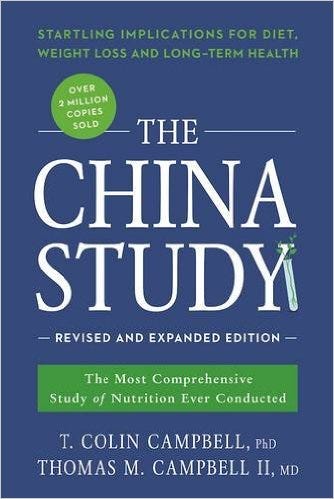Learn how a change in your diet can prevent and sometimes even reverse diseases.

The health of many westerners has steadily worsened despite big advancements in medicine and healthcare. The rate of diabetes among 30–39 year-olds rose by 70% between 1990 and 1998 and since 1970 cancer rates have risen.
Even modern medicine with all its advancements hasn’t come up with a “magic pill.” Overconfidence in medicine to help us remain healthy doesn’t always seem reliable too because the medication can have severe side-effects.
A way better focus would be to prevent disease instead of waiting for it and then try to solve it. The biggest long-term health factor turns out to be nutrition.
Maintaining a healthy diet has shown to prevent and even reverse early stages of heart diseases.
Protein, we don’t need nearly as much as we think
The China Study
In the early 1980’s, researchers from Cornell University and the University of Oxford performed in one of the largest ever public health studies in partnership with the Chinese government.
The Chinese Premier had already encouraged a series of cancer studies which had produced several decades of data in the so-called Cancer Atlas. The Atlas gave the Cornell-Oxford researchers a good primer for their own study.
There were two good reasons the study was performed in China. First, China has a very genetically homogenous society which means genes wouldn’t distort the results. Second, Illness rates vary widely by region sometimes by a factor of 100, thus if genetics aren’t to blame, environmental factors likely play a big role. These conditions were perfect for a study about how environment factors like diet, influenced health.
Another great opportunity for the study was the fact that diets in China vary between primary plant-based to a more animal-based protein which gives a nice opportunity to see how it correlates with specific diseases.
Animal-based diets
A China consumption of animal-based protein is closely tied with eating less fat. A Study found that Chinese women whose intake of dietary fat averaged 24% had a higher risk of developing breast cancer than those whose intake was 6%.
The China study revealed a strong connection between diets high in animal proteins and cancer.
Low protein diets have the ability to decrease enzyme activity by 76%. Enzymes enable carcinogens (cancer-causing agents) to convert normal cells into cancerous cells. Even if carcinogens are present in the body, they are less likely to infect the body’s cells because there is around 76% less enzyme activity on low protein diets.
Tumors develop through a precursor named foci, which presence and size are primarily determined by protein intake not the presence of carcinogens.
Animal studies showed that low doses of aflatoxin (carcinogens) in combination with high level of animal proteins developed nine times as many tumors as large amounts of aflatoxins and a low-protein diet.
Interestingly, rats exposed to plant based proteins like wheat or soy didn’t experience growth in foci (pre-cancerous).
A Plant-based Diet
These studies reveal that plant-based diets can prevent the promotion of cancer. Woman are better off with a plant-based diet because it reduces the probability of getting breast cancer considerably.
A plant-based diet is also healthier because of the high fiber contents. High-fiber diets correlate to lower cholesterol in the blood and lower instances of colon and rectal cancer.
Plant-based diets also provide precious antioxidant nutrients, which fight off damaging free radicals in the body. Free radicals can cause macular degeneration which can lead to gradual blindness.
Eating right
The author created 8 principles of a better nutrition based on what he learned.
Principle 1
Our body needs a wild variety of complex nutrients or biochemical bonanza as he calls it. Instead of focusing on individual nutrients we should go for variety.
Principle 2
Vitamin supplements cannot replace good whole foods. Isolated nutrients are a waste of money and some of them even are potentially dangerous as they can cause an intoxication.
Principle 3
Plant-based foods have a much better nutrient profile than animal-based foods. Plant-based foods have a lot more antioxidant, fiber, and mineral content than animal foods.
Cholesterol is essential for our health, but our bodies can produce all they need, so consuming them in food is not essential. Our bodies are better off with sunshine and beta-carotene, the vitamin precursors of vitamins A and D, because they then have the control over quantity and timing.
Principle 4
Genes don’t determine disease on their own, they have to be activated or expressed first, and that activation has a lot to do with nutrition.
Principle 5
Long before modern chemicals like antibiotics and hormones were introduced into our foods. People still began to experience more cancer and cardiovascular diseases when they started a more animal-based diet.
The lesson: Organic foods are only marginally better than conventional foods. Organic beef has much the same nutrient profile than conventional beef, so it still represents nearly the same danger to health.
Principle 6
Nutrition which prevent disease can also halt or reverse disease.
Principle 7
You can prevent diseases across the board with one good simple diet. A good diet to prevent one disease won’t cause another different one.
Principle 8
There is a synergy between a healthy diet capable of preventing diseases and physical energy. There is also a synergy between physical exercises and good nutrition. The sum is better than each part on its own.
Are you ready to change your life with a more safer, more educated diet?
